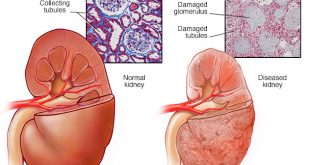Chronic Kidney Disease (CKD) is diagnosed when there is either
a) 50% loss of normal kidney function which persists for at least 3 months OR
b) presence of kidney damage diagnosed by:
- urine abnormalities or
- abnormal findings on a kidney biopsy or
- abnormal radiological abnormalities
Kidney function is measured in terms of glomerular filtration rate which signifies the amount of blood that is purified by the kidneys in a period of time, usually mls/min. It is calculated from a mathematical formula based on parameters like age, race, gender. An individual with normal kidney function would have a GFR ≥ 90mls/min/1.73m2
The National Kidney Foundation has divided the staging of CKD into 5 stages:
|
Stage |
GFR (ml/min/1.73m2) |
Description |
|
1 |
≥ 90 |
Normal or increased GFR, |
|
2 |
60 – 89 |
Slight decrease in GFR, |
|
3A |
45 – 59 |
Moderate decrease in GFR, |
|
3B |
30 – 44 |
|
|
4 |
15 – 29 |
Severe decrease in GFR, |
|
5 |
<15 |
Established renal failure |
Source: National Kidney Foundation. KDOQI Clinical Practice Guidelines for Chronic Kidney Disease: Evaluation, Classification, and Stratification. Am J Kidney Dis 39:S1-S000, 2002 (Suppl 1)
When an individual has proteinuria at any stage of CKD, a suffix “p” should be added. This is of importance, as proteinuria is associated with an increased cardiovascular risk and is an independent marker of progression of the disease.
When an individual in stage 5 CKD is on dialysis, a suffix “d” should be added. This is to help identify individuals on dialysis.
When an individual has received a transplanted kidney, a suffix “t” should be added. This is to help identify a transplanted individual.
- Stage 1 CKD
Such individuals have kidney damage with normal kidney function , i.e. GFR ≥ 90mls/min/1.73m2. Kidney damage is diagnosed by urine abnormalities, abnormal findings on a kidney biopsy or abnormal radiological abnormalities. - Stage 2 CKD
Such individuals have a mild reduction in renal function. They have kidney damage with GFR values of between 60-89mls/min/1.73m2. Kidney damage is diagnosed by the urine abnormalities, abnormal findings on a kidney biopsy or abnormal radiological abnormalities. Stage1 or Stage 2 CKD are often referred to as mild renal or kidney insufficiency. Individuals at this early stage of CKD do not normally have any symptoms. Hence, to detect early CKD, high-risk individuals are recommended to undergo screening tests at least once a year. (see “Who to screen for kidney disease?”) - Stage 3 CKD
Such individuals have a moderate reduction in renal function. They have GFR values of between 30-59mls/min/1.73m2. Complications such as anemia, mineral bone disease and much more start at this stage.Some doctors further divide CKD into Stage 3a (GFR between 45-59mls/min/1.73m2) and Stage 3b (GFR between 30-44mls/min/1.73m2). It is said that individuals with Stage 3a have a better prognosis than Stage 3b as the risk of developing complications of CKD are less in the former. This aids in the screening and referral process.Individuals with stage 3b CKD should be seen and manage by nephrologist - Stage 4 CKD
Such individuals have a severe reduction in renal function and should be seen and managed by a nephrologist. They have GFR values of between 15-29mls/min/1.73m2. At this point, individuals are often counseled for therapy to replace the inadequate function of the kidneys. Individuals are offered either haemodialysis or peritoneal dialysis or living related transplantation if there is a suitable kidney donor . Preparations for access creation are also discussed. Individuals who opt for haemodialysis require a vascular access to be created at least 6 weeks before it can be functional. Individuals who opt for peritoneal dialysis need a catheter to be placed into the abdominal cavity 2-4 weeks before the commencement of peritoneal dialysis. - Stage 5 CKD
Such individuals have established kidney failure. They have GFR ≤ 15mls/min/1.73m2. These individuals require permanent renal replacement therapy to sustain life.
Other aspects of Staging CKD:
Importance of staging
The importance of this staging system is that it plays an important aspect in the management of CKD patients from:
- screening of at-risk patients
- slowing CKD progression
- management of complications of CKD
- preparation for dialysis or transplant as required
| Last Reviewed | : | 3 May 2016 |
| Writer | : | Dr. Anita Bhajan Manocha |
| Accreditor | : | Dr. Sunita Bavanandan |
 PENDIDIKAN PESAKIT Kementerian Kesihatan Malaysia
PENDIDIKAN PESAKIT Kementerian Kesihatan Malaysia
